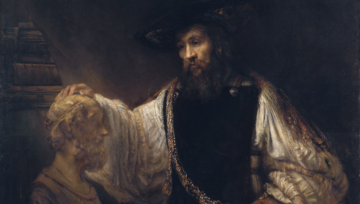Riley Moore in Quillette:
 Riley Moore: It’s difficult to discuss Aristotle without discussing everything, because Aristotle wrote about everything—ethics, logic, biology, politics, literature; anything knowable, he investigated it. You go through this in detail in your newest book, Aristotle: Understanding the World’s Greatest Philosopher. Let’s pretend I have never heard of Aristotle. Who was Aristotle, biographically? Was he a pupil of Plato just as Plato was a pupil of Socrates? Is there a direct lineage there?
Riley Moore: It’s difficult to discuss Aristotle without discussing everything, because Aristotle wrote about everything—ethics, logic, biology, politics, literature; anything knowable, he investigated it. You go through this in detail in your newest book, Aristotle: Understanding the World’s Greatest Philosopher. Let’s pretend I have never heard of Aristotle. Who was Aristotle, biographically? Was he a pupil of Plato just as Plato was a pupil of Socrates? Is there a direct lineage there?
John Sellars: Yes, there is. Aristotle was originally from northern Greece. His father was a doctor who died when Aristotle was about 10 years old. Aristotle is then brought up by his uncle who had been a student at Plato’s Academy some years earlier. When Aristotle reaches 17 or 18, he goes to Athens to study at Plato’s Academy and stays there for 20 years. Plato is certainly the key point of reference. Socrates, Plato, and Aristotle make up this kind of triumvirate of significant Greek thinkers, and they’re all engaging with their predecessors. We see Aristotle wrestling with Plato’s ideas and ultimately trying to break away from them in order to develop his own independent views. That’s the beginning of Aristotle’s career.
Then Plato dies, and the Academy passes to Plato’s nephew. Aristotle decides that’s a good point to leave.
More here.
